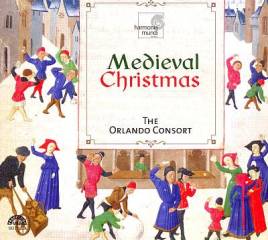Medieval Christmas (2006)
Medieval Christmas (2006)

1. Christe redemptor (Winchester Troper) 2. Quem Iohannes (Winchester Troper) 3. Alleluia V. Dies sanctificatus (Winchester Troper) 4. O primus homo corruit (Aquitanian) 5. Lux refulget (Aquitanian) 6. Annus renascitur (Anonymous) 7. De quan au'on peut (Anonymous) 8. Tout mon desir (Arnold de Lantins) 9. Ce jour de l'an (Guillaume Dufay) 10. Clangat tuba (Ritson MS) 11. Ave rex angelorum (Egerton MS) 12. Eya, martyr Stephane (Anonymous) 13. Vox in Rama (Clemens non Papa) 14. Lullay, Lullow: I saw a swete semely syght (Ritson MS) 15. O admirabile commercium (Loyset Compere) 16. Pastores loquebantur (Clemens non Papa) 17. Noel, noel, noel (Antoine Busnois) 18. Noe, noe, noe (Antoine Brumel) 19. Nato canunt omnia (Antoine Brumel) Orlando Consort: Robert Harre-Jones – counter-tenor Mark Dobell – tenor Angus Smith – tenor Donald Greig - baritone
In the 10th or 12th or 15th centuries, Christmas as we know it hadn't been invented, and such things as carols were yet to be defined as a specifically Christmas genre--indeed they could pop up at any time of year, and were as likely to celebrate the birth of Spring as the Babe in Bethlehem. What this means for modern compilations of Medieval Christmas repertoire--which also includes motets, songs, and chant--is that most of the music will have no overt connection to Christmas for today's listeners. In fact, these carols, motets, and songs sound just like any other music from the periods in question, so a listener intrigued by a disc title such as "Medieval Christmas" will be confronted with what sounds like any other "early music" vocal program. The challenge then for performers is to both provide an exemplary realization of the music and style for seasoned early-music aficionados while also providing illuminating context for novice listeners to happily explore what remains an endlessly fascinating and continuously vital area of music history.
The four male singers who make up the Orlando Consort (here joined by occasional collaborator Robert MacDonald) have proven to be crafty programmers with such engaging releases as Medieval Gardens and Food, Wine, and Song (see Reviews), and here they manage to organize their careful selections in a way that both flows well and makes it easy to discern and appreciate the music's stylistic distinctions, from early polyphony to the almost crude-sounding secular rondeau of Dufay to the elegant Clemens non Papa motet Pastores loquebantur. Further, the program is divided into logical sections that relate to the music's function and association with the various feasts of Christmas, from the Masses for Christmas Day and St. Stephen to the Feasts of the Holy Innocents, St. Thomas, and the Circumcision (the First of January).
As we've come to expect, the singing is first-rate--vibrant, impeccably tuned, and with a strong rhythmic vitality, supported by ideal sound. And although it will be the rare listener who recognizes any of these works, that actually is a good thing: what can be wrong with stretching our knowledge and experience a little bit, especially when it comes to a tradition so comfortable and familiar as Christmas? --- David Vernier, ClassicsToday.com
download: uploaded solidfiles anonfiles yandex 4shared mediafire mega filecloudio binge








